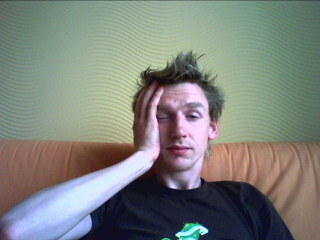Ever sworn off drinking after a particularly wretched hangover?
Happy Friday! “Hangovers appear to have a very modest effect on subsequent drinking,” says Thomas M. Piasecki, a University of Missouri professor and author for a new study published in Alcoholism: Clinical & Experimental Research. “On average, the time between drinking episodes was extended by only a few hours after a hangover. We looked to see whether there were particular subgroups of drinkers who might show distinctive patterns like ‘hair of the dog’ use, but we didn’t find clear evidence for that.”
“Even when the drinkers were acutely suffering a hangover, it didn’t seem to affect their conscious drinking intentions. No doubt this reflects the fact that drinking behavior is determined by a host of factors, like day of the week, opportunity, and social plans.”
This may come as no surprise to you, but I know that on the rare occasions I have a little too much fun, I DO swear off drinking—and often succeed, at least for a little while.
But Piasecki and his colleagues recruited 386 (196 males, 190 females) community-based frequent drinkers whose results conflict with mine. They electronically recorded their likelihood of drinking later the same day every morning and the ratings made on hangover and non-hangover mornings did not differ. Analysis was performed on data culled from 2,276 drinking episodes, including 463 episodes that were followed by self-reported hangovers in the morning-diary entries.
“There were some complicated interactions that indicated that if you stopped drinking while you still wanted to drink more, or if you had financial troubles, then you delayed drinking a few hours more if you also had a hangover in the morning than if you had no hangover,” notes Damaris J. Rohsenow, a professor of behavioural and social sciences at Brown University School of Public Health. “However … the people who experienced hangover also tended to experience more pleasure from drinking the night before, and those immediate pleasurable effects are likely to drive drinking decisions more than expecting an unpleasant hangover would.”
“It is well known in psychology that immediate positive or negative effects of a behavior are far more powerful than delayed effects in affecting whether people engage in that behavior again.”
Some studies show that younger drinkers do not consider hangovers to be a negative experience, and that many drinkers are willing to experience hangovers time after time. This suggests, “that it is probably a waste of time to discuss hangovers when trying to motivate a problem drinker to drink less or drink less often. Drinkers do not seem to be bothered that much by the temporary discomfort of a hangover,” says Rohsenow.
“Remember that hangovers are 100 percent preventable by abstaining from alcohol or drinking responsibly,” reminds Piasecki.

